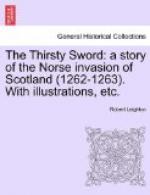Sir Piers was met by five Norse chiefs, and he encountered them with fierce courage. One by one he felled them to the ground, cleaving their brass helms with his heavy axe. And ever as they fell their places were taken by as many others. At his horse’s left side fought Kenric, Allan, and Duncan; Kenric swinging his great sword and smiting right and left at those who tried to reach the horseman, Allan and Duncan in like manner fighting with steady blows. And thus they pressed their way ever farther into the ranks of the enemy, moving with Sir Piers, backward or forward, and defending his left side as he slew his assailants on his right.
Kenric heard the gallant knight’s panting breath growing weaker.
“To the other side, Duncan,” he cried. And Duncan Graham worked round behind the horse’s tail to relieve Sir Piers of some of his foes who pressed upon him. Not long had he changed his position when Kenric saw the horse swerve and fall. A deep groan from Sir Piers was all that told of the terrible wounds he had received.
The Norwegian chronicle recording this fight says that Sir Piers de Currie was killed by a blow which severed his thigh from his body, the sword cutting through the greaves of his armour and penetrating to the saddle. Howbeit the brave Sir Piers was slain, and the man who slew him was the outlaw Roderic MacAlpin.
Duncan Graham, seeing who had done this thing, at once closed with Roderic, and the two fought with terrible vigour.
Now Duncan, ever since he had received that wound in his chest over at Coll, had lost the power to raise his right arm above his head, and it went ill with him. When Kenric, rushing to Sir Piers de Currie’s right side, first saw his enemy, Roderic was in the act of smiting a fearful blow upon Duncan’s bare and outstretched neck. Duncan fell, not even uttering a groan, so speedily fatal was the blow he had received.
But above the clang of the battle and the thunderous surging of the waves, there rose at this moment into the air a woman’s cry of anguish. It was the cry of Aasta the Fair.
Wearing the same coat of mail and helmet that she had worn at the siege of Rothesay, and wielding a light broadsword, she had been fighting with as fearless bravery as any man there present. She had cloven her way through the battling men to the place where rose the towering head of her lover Duncan, and arrived at his side at the very moment when the sword of Roderic smote him down. Splashed with her lover’s blood she gripped her sword, nor paused to see if Duncan were indeed dead. She leapt with a wolf-like howl upon Roderic MacAlpin, and so pressed him with her blows that he stepped back and back.
The maid, though strong, was ill-trained in the use of the sword, and her every blow was skilfully parried. But to Aasta’s side came Kenric, his eyes gleaming with fierce hatred of his foe. They were now at the very verge of the sea, and the spray from the surging billows fell upon them like heavy rain. Roderic struck at Aasta, muttering a curse, and Kenric in parrying that blow missed his chance. He saved Aasta’s life, but before he could recover his weapon, Roderic had quickly turned round and plunged into the foaming waves.




